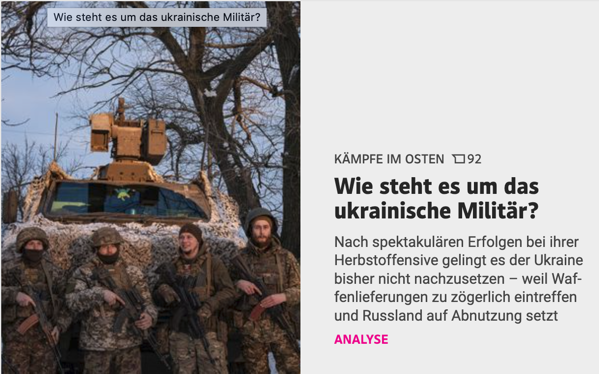
(Analyse / Fabian Sommavilla, Florian Niederndorfer)
Wow.
Die US setzen ebenfalls auf Abnutzung:
“Putin is threatening Armageddon, and the Russians are doing it all the time, sometimes in oblique ways and sometimes in a more direct way,” said John Sullivan, who served as U.S. ambassador in Moscow until September and was surprised during his tenure by how frequently his Russian interlocutors casually raised the prospect of nuclear war. “But when you actually poke at that and provide weapons gradually over time, there hasn’t been the catastrophic response that Putin promised.”
Though Mr. Putin’s nuclear blackmail didn’t fully succeed, it did prompt initial restraint in Western military support for Ukraine. In the first several months after the Russian invasion, the Biden administration took a gradualist approach that White House officials have described as “boiling the frog.” As the U.S. began to introduce new weapons systems, it did so slowly and, initially, in limited numbers. None of these individual decisions were of sufficient scope to provoke a dramatic escalation by Moscow. But over the past 12 months, the cumulative effect of these new weapons has transformed the balance of power on the battlefield and enabled a string of strategic Ukrainian victories. (Wall Street Journal)
src: click
Lloyd J. Austin:
As Russia’s invasion of Ukraine has transformed into a grinding war of attrition with no meaningful peace deal in sight, the US and its allies have begun to convey a new, longer-term goal for the war: to defeat Russia so decisively on the battlefield [in Ukraine] that it will be deterred from launching such an attack ever again.
src: click
Blinken:
Russia’s become mired [bleibt stecken] in a war of attrition of its own making, and despite what you hear from propagandists in the Kremlin, our intelligence indicates that Russian military continues to suffer from low morale, high casualty rates, equipment failures, and leaders who are afraid to tell the truth about what’s really happening on the ground.
Second, we’re raising the costs on Russia to bring the war to an end more swiftly through unprecedented sanctions and export controls.
src: click
[Das zweite Statement ist falsch, die geschätzte Kriegskasse Russlands war für drei Jahre gefüllt. Die Sanktionen nicht so wirksam, dass sie mit hoher Wahrscheinlichkeit eine Verkürzung des Konfliktes bewirken hätten können. Die Sanktionen wirken, aber sie wirken langfristig. Blinken sollte das wissen. Bei einer Konstruktion des Arguments in dieser Form, legt das PR nahe.
edit: Ups, DW Korrespondent nicht richtig gebrieft:
Ukraine kämpft auch in Bachmut, weil sie glaubt Russische Soldaten verschleißen zu können - Zitat: Head of ukraines delegation to the NATO Parliamentary Assembly. Naja - lieber nicht weiter drüber berichten.
Der Konflikt soll aktuell (und sollte auch bereits Ende Juni) durch eine militärische Entscheidung gedreht werden. Nicht durch Sanktionen.]
Und für die, die an dieser Stelle argumentieren wollten dass sich “Boiling the frog” geändert hätte, also dass man jetzt schneller an der Temperatur gedreht hätte - Nein, und nein (GLSDB werden geliefert, ATACMS nicht).
Die Schlammsaison macht Panzerschlachten beidseitig aktuell unmöglich, hat bereits begonnen, und hilft eher Verteidigern:
Die kommende Schlammsaison in der Ukraine
Der dritte Faktor ist die übliche, bereits bekannte Schlammsaison, die berüchtigte Rasputitsa (russisch) oder Bezdorizhzhia (Ukrainisch). Im Frühjahr verwandeln die Schneeschmelze und der nicht gefrorene Boden in Verbindung mit heftigen Regenfällen, alle Felder und unbefestigten Straßen in kaum befahrbare Schlammmeere.
Das erschwert mechanisierte Manöver erheblich. Auch wenn der derzeitige Winter in der Ukraine ungewöhnlich mild war, ist es nicht leicht, die Rasputiza vorherzusagen, die normalerweise von Mitte März bis Mitte April oder sogar bis zum Ende des Monats dauert. Ein weiterer Grund, der Putin also dazu bewegen könnte, schnell zu handeln. (ZDF)
src: click
Der Schlamm hilft oft den Verteidigern
Doch diesmal könnte der Schlamm ein Vorteil Russlands sein, denn die Initiative im Krieg hat sich ins Gegenteil verkehrt. Aktuell befindet sich die Ukraine auf dem Vormarsch, hat Offensiven etwa in der Region Cherson laufen. Grundsätzlich stärkt die Rasputitsa den Verteidiger, sie kann aber auch einen schnellen Rückzug angesichts eines überlegenen Gegners unmöglich machen. (ZDF)
src: click
DONETSK PROVINCE, Ukraine (Reuters) -Russian forces were trying to close their circle around the small mining city of Bakhmut on Monday, while rain and an early spring thaw turned eastern Ukraine’s battlefields to mud which could hamper both sides as they try to take the initiative.
The spring thaw, known as the rasputitsa, has a long history of ruining plans by armies to attack across the soil of Ukraine and western Russia, turning roads into rivers and fields into impenetrable bogs.
In the Donetsk region near the front, Ukrainian soldiers hunkered in muddy trenches after suddenly warmer weather softened the frozen ground.
“Both sides stay in their positions, because as you see, spring means mud. Thus, it is impossible to move forward,” said Mykola, 59, commander of a Ukrainian frontline rocket launcher battery, watching a tablet screen for coordinates to fire. (Reuters)
src: click
Diese Gesellschaft ist das ABARTIGST Allerletze.

